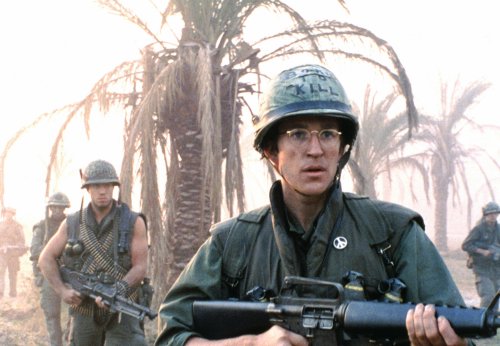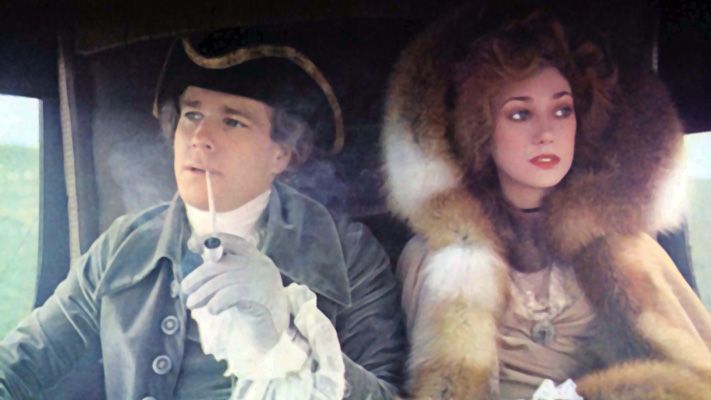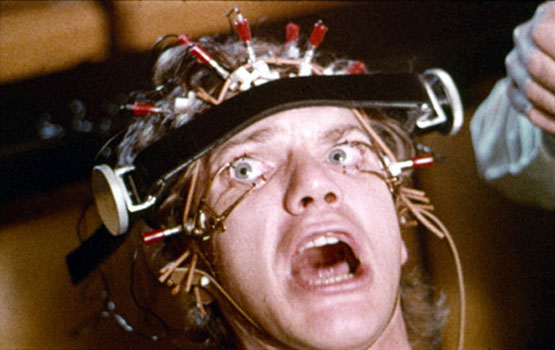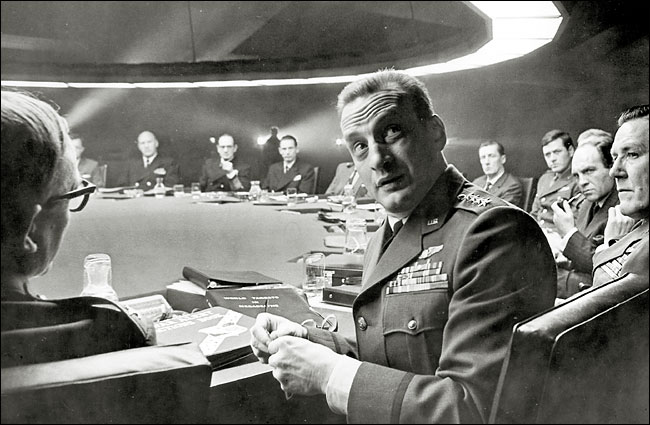Starring: Tom Cruise, Nicole Kidman, Sydney Pollack
Directed by: Stanley Kubrick
Plot Summary: Dr. Bill and Alice Hartford are a young married couple living in New York. While attending a Christmas party, an older gentleman begins to hit on Alice while Bill is away flirting with two young women. The next evening, after smoking some marijuana, Alice asks Bill if he ever gets jealous. Bill reassures her that he is not jealous because he thinks women are more faithful than men and that he won't be unfaithful like other men because he loves his wife. In an act of spite, Alice tells Bill of a recent fantasy she had about a naval officer, which clearly gets Bill upset. After receiving a call to tend to a patient, Bill goes to work, but strays from coming home and instead walks around the city looking for his own way to pursue a fantasy.
As we come to the end of my Stanley Kubrick, retrospective, I find myself very perplexed by his final film Eyes Wide Shut. Described as an erotic thriller, there was one word I had on my mind that left me very skeptical about this film: pornography. Yes, I was absolutely terrified that the last film Kubrick would grace us with before his death was nothing more than a married couple's sex tape. While the film still is full of perverse imagery, the film couldn't be further from my original perception. At the time, the film's two main lead were one of Hollywood's biggest "it" couples, yet they share very little screen time together, and there is a much bigger theme that is presented of the concept of fantasy vs. reality. Masked behind some beautiful production design (you'll soon see what I did there) and a provocative narrative, the final question I have for this film was whether or not Kubrick left the world on a high note.
 Eyes Wide Shut stars Tom Cruise as Dr. Bill Hartford. I will say this about Tom Cruise: the man has charisma. Regardless of what some people may think nowadays about him, it can't be denied that in the '90s, there was arguably no actor with more charisma than Tom Cruise. However, that doesn't translate out to a diverse acting range. Only a handful of times has he really transformed himself in a role, and most times you still see Tom Cruise on the screen. Is that bad? Depends on how you like your actors. For me, I can look at Cruise and swap out the ability to be a chameleon actor for someone who has all the tools it takes to be a megastar of the silver screen. Bill is also a pair of eyes for the audience to some very bizarre and dare I say kinky activities that some may not be aware of. As Bill's interest grows, so does the curiosity of the audience. That's a very powerful and effective strategy when crafting your main protagonist that I believe works really well considering how messed up some of it can get.
Eyes Wide Shut stars Tom Cruise as Dr. Bill Hartford. I will say this about Tom Cruise: the man has charisma. Regardless of what some people may think nowadays about him, it can't be denied that in the '90s, there was arguably no actor with more charisma than Tom Cruise. However, that doesn't translate out to a diverse acting range. Only a handful of times has he really transformed himself in a role, and most times you still see Tom Cruise on the screen. Is that bad? Depends on how you like your actors. For me, I can look at Cruise and swap out the ability to be a chameleon actor for someone who has all the tools it takes to be a megastar of the silver screen. Bill is also a pair of eyes for the audience to some very bizarre and dare I say kinky activities that some may not be aware of. As Bill's interest grows, so does the curiosity of the audience. That's a very powerful and effective strategy when crafting your main protagonist that I believe works really well considering how messed up some of it can get.Nicole Kidman plays Bill's wife Alice. There's not much to say about Alice as a character since the film doesn't really follow her. While Bill is off having his adventures, Alice is at home, not really doing anything for the narrative. However, she is a VERY crucial element for getting the plot started. Thanks to an argument they have, Alice puts an idea in Bill's head to intentionally make him jealous at the idea that she could be with another man. The idea haunts Bill's thoughts and no matter how much he tries to shake them, they remain in his head. It can then be said that because of this, she triggers his desires to seek out a taboo fantasy in order to have that same feeling. After this, Alice kind of becomes a means to an end. She becomes this element that is always within Bill's mind during all this to remind him of where his reality should stand: at home with his wife. But it's hard to say that she does much else after the 30 minute mark, which is really disappointing knowing the star power Kidman had at the time. Also, I'm sure many male moviegoers remember Kidman's performance based on the amount of time she's naked, but probably not much else. Is it possible to say that Kubrick didn't win over the feminists with this film?
The biggest amount of respect I can give to this film is that it knew how to utilize its production design in order to create some vivid, captivating, and even frightening imagery. Through the use of Venetian style masks, the film looks at this secret society and is able to give each member a different, yet memorable face to look at. The film also has a very eerie main theme that accompanies the suspenseful and tense scenes, highlighted by its use as Bill looks around the room to see all these different types of beautiful and scary masks staring him in the face. Remember what I have said about Kubrick being able to get so much out of so little? That's present here specifically, as he was able to make so many extras stand out in a crowd through the use of a simple costume consisting of a black cloak with a hood and a Venetian mask.
One thing that may surprise a lot of viewers their first time watching it is the Christmas atmosphere that surrounds this movie. Now don't worry, I'm not going to fight for this movie as a Christmas classic as I would with a film like Die Hard. I know which battles to pick. Anyways, nearly every scene in the movie has some form of Christmas decoration in it, lit up with strings of lights or having a tree in the corner. The entire film is very fluorescent and vibrantly colored thanks to the lights. It reminds me of his lighting approach in Barry Lyndon, but more up to date since this movie takes place in a modern day New York. Even more beautiful to look at is when a character enters a dark room only lit up by the Christmas lights, really bringing about a combination of a dark and colorful dreamlike environment.
In conclusion to Kubrick's career, I gotta ask whether or not Eyes Wide Shut was the proper way for him to go out, or more accurately "Did Kubrick go out on top?" While I may not think it was my favorite of his movies, I have to admit that it is at least an interesting film to watch. The critical side to it is only half anyways, as one of the toughest critics of Kubrick's work was Kubrick himself. So, does it change my opinion to know that Kubrick considered this his greatest contribution to film? Not for me personally. I respect his opinion to value some of his films more than I do (he made them for crying out loud), but if I was looking at his greatest contributions to film, I'd go more along the lines of A Clockwork Orange and The Shining (heck, even 2001: A Space Odyssey for the visuals). I will say, if he was basing his pick for greatest contribution to film on the amount of controversy surrounding it, then I'll say Eyes Wide Shut has a strong chance of taking the crown since it had many people buzzing about the heavy use of sexual content. Still, the movie had me talking about it after I saw it, which is something I can say about every Kubrick film I watched these last two months (both in good and bad ways), so I do understand why he is such a fan favorite director with movie buffs. I may not have liked every film I saw of his, but I at least appreciate what he did on this earth as a filmmaker. And that's quite the compliment if I do say so myself.
Rating: 3 out of 5 stars
There are a lot of artsy themes and imagery in Eyes Wide Shut, but I found the use of mainstream stars like Cruise and Kidman to be a bit distracting, so I'm a little disappointed this was his final contribution to film. But if you're a big fan of Kubrick, I'm sure you'll appreciate it, so give it a rental. Just don't watch it with your parents.
Eyes Wide Shut and movie images are copyrighted by Warner Bros.










